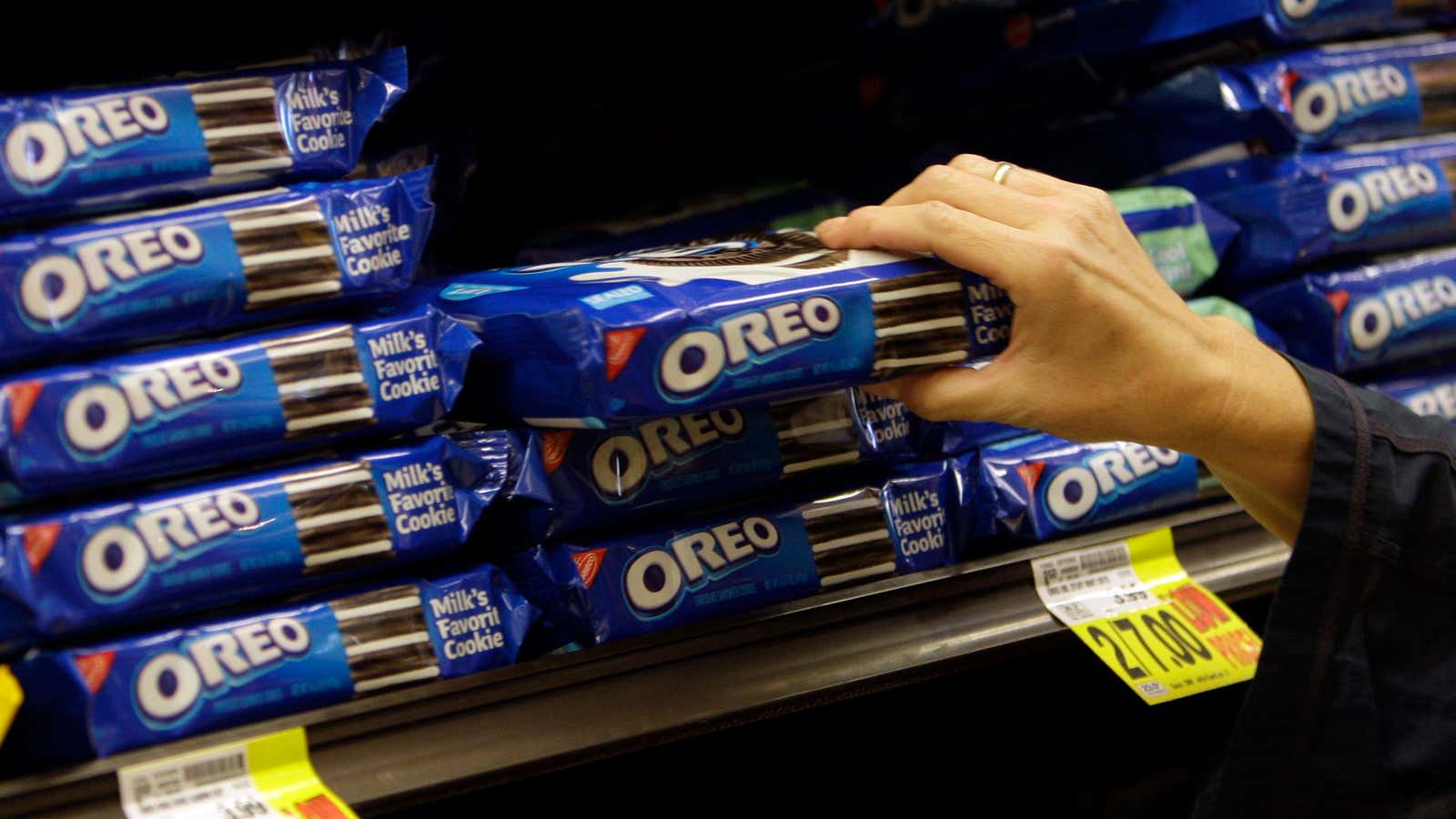“You have to pay extra for double-stuffed,” begins what is no doubt one of the more entertaining letters sent to the Federal Communications Commission (FCC) in defense of data caps.
US cable company Mediacom invoked the chocolate-and-cream sandwich cookie Oreo in its case for why the FCC should end its war on data caps and usage-based pricing polices, which charge customers for internet service based on how much data they consume, just as telecom companies do for mobile. In a letter filed with the FCC last week, the New York-based provider, which serves about 22 states, explained that data caps are just like packages of Oreos: You have to pay more to get more.
Until earlier this year, the FCC had been relatively quiet about data caps, which cable companies like Comcast and Mediacom had begun imposing or enforcing more often as internet usage increased. But, in April, with a hefty stack of consumer complaints in its inbox, the US regulator took a stance on the issue by barring Charter Communications and Time Warner Cable from imposing data caps for seven years, as part of restrictions placed on a merger between the two companies, which formed the second-largest cable operator in the US. Netflix later chimed in, in September, to ask the FCC to crack down on data caps. And now Mediacom, which has imposed data caps since 2012, is stepping up to defend the controversial pricing policy.
“Imagine you are out for a walk and experience a sudden, irresistible craving for Oreo® cookies,” Joseph Young, senior vice president and general counsel at Mediacom, wrote in the letter. “You only want to spend two dollars, which means that you will be able to buy a two-pack or maybe even a four-pack but for sure you cannot get the family size of over 40 cookies. For that many, you have to spend more. Of course, it would be nice if your two dollars bought you the right to eat an unlimited number of cookies, but you know that is not the way our economy works.”
By that logic, if data caps are like boxes of cookies, customers should know exactly what they’re going to get out them. But, as Ars Technica points out, that’s not always the case with the internet. There are questions about how accurately internet-service providers measure data usage, no regulators ensuring that the measurements are accurate, and no easy way for customers to determine or prove that they’ve been overcharged. Unlike cookies, where consumption is driven by hunger, there are also forces outside of a customer’s control that can increase data usage, the publication said, such as when the packets of internet data being delivered fail to reach their destination and have to be resent.
Mediacom’s lengthy argument also gets muddied at other points, like when it compares vanquishing data caps to wanting to buy a Lamborghini sports car for the modest price of a Kia. Again, the argument is that you pay more to get more. But, in this case, you’re paying extra for quality rather than consumption. So the difference between the two auto brands is really more akin to the tiers of internet speeds that service providers sell (up to 50 megabits per second, 100 Mbps, etc.) than data usage, which is a separate issue.
It is related, though. Part of the argument against data caps, which Netflix brought up in a separate letter to the FCC this month, is that data caps and usage-based pricing essentially charge customers twice for the same connection: once for speed and again for usage. Netflix argued that customers have grown accustomed to paying more for faster internet speeds, and that data caps and usage-based pricing “unreasonably” tack on fees for connections that customers have already paid for.
Mediacom, however, said that internet-service providers shouldn’t be criticized for charging customers for both higher internet speeds and higher data caps because other industries do the same thing. Truck manufacturer Ford would charge separately to soup up its F150 pickup truck with both a bigger engine and more cargo room, for example, Young said in the letter.
MediaCom also pulled Netflix, which seems to have prompted the cable company’s outcry with its earlier letter, into the argument. Mediacom compared data caps and usage-based pricing to the various streaming plans that Netflix sells. “Ironically, those who think ISPs are greedy pigs or evil villains because they charge based on consumption through caps or usage-based pricing do not direct the same moral outrage toward edge providers who price their services in basically the same way,” Young lamented.
The two are not the exactly the same. Netflix’s charges more for higher video quality and the ability to stream across multiple devices, not consumption. All Netflix’s plans offer unlimited streaming, or consumption, of TV shows and movies. The argument is similar to that of the pickup truck though.
Regardless, the letter correctly pointed out that Netflix and other web-based platforms and services do not have altruistic reasons for fighting to end data caps, not that they’ve tried to hide that. (“Nobody’s a boy scout. Not even boy scouts,” Mediacom’s letter said, quoting Frank Underwood from Netflix’s popular series House of Cards.) If the cost of the internet is commensurate with consumption, customers will have to seriously evaluate how much data they use. And streaming video uses a lot of data. Some people may decide that Netflix just isn’t worth it, when coupled with the cost of data usage, or more likely, that they’ll have to scale back viewing.
“They are trying to sell their self-interest as the public interest, when, in reality, they are just looking for some free cookies,” Mediacom concluded, going back to its initial metaphor.
Internet-service providers, meanwhile, are trying to milk those cookies for all they’re worth.
